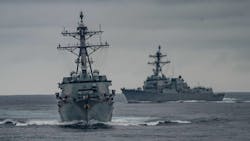Navy's latest $4.1 billion CANES computer contract pits industry heavyweights in potential litigation
WASHINGTON – The U.S. Navy last month awarded a collective $4.1 billion contract to eight companies to provide computers and networking equipment for cyber warfare over the next decade for surface warships and submarines.
It's part of the Consolidated Afloat Networks and Enterprise Services (CANES) project to provide computer hardware, software, spare parts, maintenance, and laboratory equipment for ships and submarines.
That eye-popping amount of more than four billion dollars is a virtual guarantee that we'll see a slew of contractor protests in the new year from companies that bid on this contract, yet were not selected. A contract of that high dollar amount rarely, if ever, fails to attract protests, which could delay this crucial program for months, if not years.
The companies taking part in this contract are BAE Systems Technology Solutions & Services Inc. in Rockville, Md.; Leonardo DRS Naval Electronics in Johnstown, Pa.; Global Technical Systems in Virginia Beach, Va.; L3Harris Technologies C5 Integrated Systems in Camden, N.J.; Leidos in Reston, Va.; Peraton in Herndon, Va.; Serco in Herndon, Va.; and VTG Milcom in Virginia Beach, Va. These companies will compete for orders over the next 10 years for CANES production units; software; software renewals; software maintenance; spares and system components; and lab equipment.
Conspicuously absent are General Dynamics C4 Systems, Northrop Grumman Corp., CGI Federal, and others that in the past have had a piece of CANES contracts. CANES will consolidate and replace existing afloat networks and networking infrastructure for applications, systems, and services for tactical cyber warfare. It will upgrade cyber security, command and control, communications and intelligence systems afloat, and replace unaffordable and obsolete networks.
If protests materialize, it won't be the first time the massive CANES program has attracted contractor protests. Eight years ago the Navy awarded a $2.53 billion eight-year contract to five companies to procure CANES computer and communications equipment. Those companies were BAE Systems Technology Solutions & Services Inc. in Rockville, Md.; General Dynamics C4 Systems in Taunton Mass.; Global Technical Systems in Virginia Beach, Va.; Northrop Grumman Corp. in Herndon, Va.; and Serco Inc. in Reston, Va.
That $2.53 billion is a huge chunk of money, and predictably the protests from companies not selected came in. As a result, the Navy expanded the list of CANES hardware contractors from five to seven, including CGI Federal and DRS Laurel Technologies.
The original contract was awarded in August 2014, the protests held-up the program until January 2015 -- a delay of five months. It won't be surprisingly if we were to see more protests this time around.
Related: Contractor protests could hold up Navy CANES shipboard networking program until December
The Northrop Grumman Corp. Information Systems segment in San Diego (now Northrop Grumman Mission Systems) was chosen in early 2012 to be the overall CANES shipboard electronics systems architect.
CANES represents a critical component of the Navy's modernization planning by upgrading cyber security, command and control, communications, and intelligence systems afloat. The increased standardization will reduce the number of network variants by ship class across the fleet, Navy officials say.
Despite probable protests, this latest $4.1 billion contract has a special emphasis on information warfare and cyber security. This contract will upgrade cyber security, command and control, communications and intelligence systems afloat, and replace unaffordable and obsolete networks.
A contract worth this much money could generate protests that could halt work temporarily until protest claims are sorted out -- just like the contracts that were awarded originally in 2014. We'll see how long the CANES project will be held up this time if protests come to pass.
The primary goals of the CANES program are to provide a secure afloat network for naval and joint operations; consolidate afloat networks using a common computing system; mature cross-domain computer technologies; reduce the size, training requirements, and logistics for shipboard networking; and increase reliability, security, interoperability, and application hosting.
CANES serves as the bridge to the future of Navy afloat networks, consolidating existing legacy and stand-alone networks, providing infrastructure for tactical applications, systems, and services, Navy officials say. CANES will consolidate and modernize shipboard network systems to improve operational effectiveness and affordability across the fleet.
CANES delivers its capabilities within one system, bringing infrastructure that will enable timely and interoperable information exchange among tactical, support, and administrative users, applications, and computer systems.
About the Author
John Keller
Editor-in-Chief
John Keller is the Editor-in-Chief, Military & Aerospace Electronics Magazine--provides extensive coverage and analysis of enabling electronics and optoelectronic technologies in military, space and commercial aviation applications. John has been a member of the Military & Aerospace Electronics staff since 1989 and chief editor since 1995.
